八年级英语上册期末复习知识点
译林版初中英语八年级上册期末复习Units5-8单元知识点梳理归纳

译林版初中英语八年级上册期末复习Units5-8单元知识点梳理归纳译林版初中英语八年级上册Unit5 Wild animals知识点梳理【词形变化】1.die vi.死→dead adj.死的→death n.死,死亡2.mean vt.意思是,意味着→meaning n.意思→meaningful adj.有意义的→meaningless adj.无意义的3.born adj.出生的→birth n.出生4.beginning n.开始,起初→begin vt.&vi.开始5.sadly adv.令人遗憾地;伤心地→sad adj.伤心的,难过的→sadness n.伤心,悲伤6.mainly adv.主要地,大部分→main adj.主要的7.danger n.危险→dangerous adj.危险的8.action n.行动;行为→act vt.& vi.行动,表演→active adj.积极的,活跃的→actively adv.积极地,活跃地9.closed adj.关闭的→close vt.&vi.关,关闭→close adj.紧密的,亲密的→closely adv.紧密地10.lost adj.迷路的,迷失的→lose vt.遗失,失去11.hunter n.猎人→hunt vt.& vi.打猎,猎杀12.living n.生存,生计→living adj.活的,现存的→live vi.居住,生活13.illness n.疾病→ill adj.生病的14.slowly adv.缓慢地→slow adj.缓慢的【重点短语】1.live in the wild 生活在野外2.have/take pity on wild animals 同情野生动物3.at four months old 在四个月大时4.weigh over 35 kilograms 重达35公斤多5.for the first time 第一次6.in the beginning 一开始7.learn to look after oneself 学会照顾自己8.live on a special kind of bamboo 以一种特殊的竹子为生9.as a result 因此10.in danger 处境危险11.take action right away 马上采取行动12.build more panda reserves 建造更多的熊猫自然保护区13.make laws to protect pandas 制定法律保护大熊猫14.at birth 出生时,诞生时15.work out easy Maths problems 算出简单的数学问题16.with the help of their mouth and ears 借助于它们的嘴巴和耳朵17.get lost 迷路18.be dangerous to humans 对人类有危险19.lose their lives 丧失他们的生命20.in the daytime 在白天【重点句型】1.So could you please not eat them?(P56)句意:所以请你不要吃掉它们好吗?Could you please…?意为“请你……好吗?”,其中Could不表示过去,只表示比can更有礼貌的请求,属非正式请求,语气较委婉;please 之后要接动词原形,其否定形式是在please之后加not,即Could you please not…?其肯定回答常用Sure./Certainly./of course,I'd love to.其否定回答常用Sorry.…如:一Could you please teach me how to swim? 请你教我如何游泳好吗?一Certainly.当然可以。
八年级上英语期末考试知识点

八年级上英语期末考试知识点本文主要介绍八年级上英语期末考试的知识点,包括词汇、语法、阅读和听力等方面,共分为四个部分。
一、词汇1. 名词常见的名词有人名、地名、国家名称、学科名称等等。
在考试中,可以通过选择题或填空题来测试对名词的掌握。
2. 动词掌握动词的时态和语态是英语学习的一个重要环节。
必须熟练掌握各种时态的用法,如一般现在时、一般过去时、现在进行时、过去进行时等等。
3. 形容词和副词形容词和副词是描述人、事物或感受的词语,要正确运用表示程度或比较级的形容词和副词。
二、语法1. 时态和语态掌握各种时态和语态的用法是英语学习的关键。
要注意在不同情况下选择不同的时态和语态。
2. 介词和冠词介词是修饰名词或代词的重要词汇。
在日常生活中,介词用法很多,要注意掌握各种情况下的使用规则。
冠词则是修饰名词的一种词语,包括定冠词和不定冠词。
3. 主谓一致在考试中,通常会考察主谓一致问题。
考生需要理解主语和谓语之间的关系,正确选择单数或复数形式。
三、阅读阅读理解是英语学习的核心部分之一,主要考察考生对短文和文章的理解能力。
考题形式包括选择、填空和简答等题型,要求考生仔细研读题目,理解文章的含义和主旨。
四、听力听力是英语能力的重要组成部分,也是考试中常见的一种题型。
考生需要通过听力材料听懂其含义,正确回答听力题目。
结语以上是八年级上英语期末考试的主要知识点,希望大家复习的时候能够认真对待,加强对英语基础知识的掌握和运用,达到更好的考试成绩。
人教版八年级英语上册知识点总结和复习要点
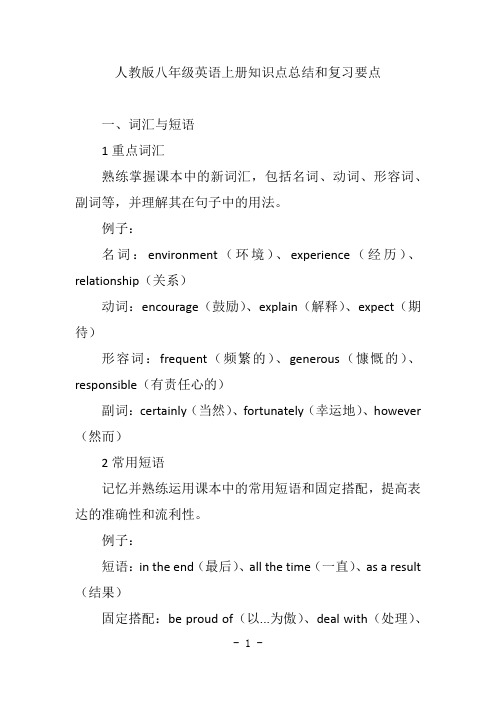
人教版八年级英语上册知识点总结和复习要点一、词汇与短语1重点词汇熟练掌握课本中的新词汇,包括名词、动词、形容词、副词等,并理解其在句子中的用法。
例子:名词:environment(环境)、experience(经历)、relationship(关系)动词:encourage(鼓励)、explain(解释)、expect(期待)形容词:frequent(频繁的)、generous(慷慨的)、responsible(有责任心的)副词:certainly(当然)、fortunately(幸运地)、however (然而)2常用短语记忆并熟练运用课本中的常用短语和固定搭配,提高表达的准确性和流利性。
例子:短语:in the end(最后)、all the time(一直)、as a result (结果)固定搭配:be proud of(以...为傲)、deal with(处理)、pay attention to(注意)二、句型与语法1基本句型熟练掌握五种基本句型,包括主语+谓语、主语+谓语+宾语、主语+谓语+间接宾语+直接宾语、主语+谓语+宾语+宾语补足语、主语+系动词+表语。
例子:主语+谓语:She sings.(她唱歌。
)主语+谓语+宾语:I like apples.(我喜欢苹果。
)主语+谓语+间接宾语+直接宾语:He gave me a book.(他给了我一本书。
)主语+谓语+宾语+宾语补足语:I found the book interesting.(我发现这本书很有趣。
)主语+系动词+表语:She is beautiful.(她很漂亮。
)2时态深入学习并掌握现在完成时、过去进行时、一般将来时、过去将来时等时态的用法和形式。
例子:现在完成时:I have already seen that movie.(我已经看过那部电影了。
)过去进行时:They were playing football when I called them.(我打电话给他们时,他们正在踢足球。
英语八年级上册重点知识归纳
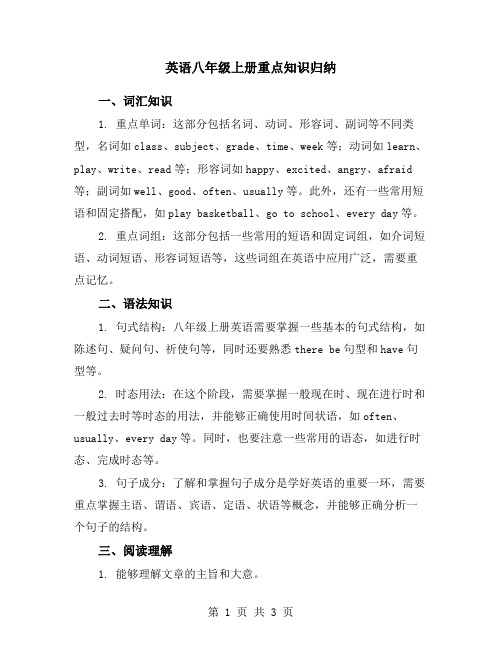
英语八年级上册重点知识归纳一、词汇知识1. 重点单词:这部分包括名词、动词、形容词、副词等不同类型,名词如class、subject、grade、time、week等;动词如learn、play、write、read等;形容词如happy、excited、angry、afraid 等;副词如well、good、often、usually等。
此外,还有一些常用短语和固定搭配,如play basketball、go to school、every day等。
2. 重点词组:这部分包括一些常用的短语和固定词组,如介词短语、动词短语、形容词短语等,这些词组在英语中应用广泛,需要重点记忆。
二、语法知识1. 句式结构:八年级上册英语需要掌握一些基本的句式结构,如陈述句、疑问句、祈使句等,同时还要熟悉there be句型和have句型等。
2. 时态用法:在这个阶段,需要掌握一般现在时、现在进行时和一般过去时等时态的用法,并能够正确使用时间状语,如often、usually、every day等。
同时,也要注意一些常用的语态,如进行时态、完成时态等。
3. 句子成分:了解和掌握句子成分是学好英语的重要一环,需要重点掌握主语、谓语、宾语、定语、状语等概念,并能够正确分析一个句子的结构。
三、阅读理解1. 能够理解文章的主旨和大意。
2. 能够理解文章的细节和事实。
3. 能够根据上下文猜测生词的意思。
4. 能够理解作者的观点和态度。
5. 不断提高阅读速度和理解能力。
四、写作知识1. 写作技巧:掌握一些基本的写作技巧,如正确的语法、拼写和标点符号,以及正确的文章结构等。
2. 写作实践:通过不断的写作练习,提高自己的写作能力。
除此之外,八年级上册英语还需要注意以下几个方面:1. 听力训练:每天坚持进行听力训练,提高听力理解能力。
2. 口语表达:鼓励学生多进行口语练习,提高口语表达能力。
在口语表达中要注意语音、语调和语速等方面的问题,同时也要注意表达的准确性和得体性。
外研版八年级上册英语期末复习重点

八年级上册英语期末复习重点Module 11、make a mistake 犯错误(make mistakes 犯错误)2、as much as possible 尽可能多地(as + 形容词或副词+ as possible :尽可能怎么样)some advice 一些意见(advice n.. 不可数,一条建议:a piece of advice)3、advise sb to do sth. 建议某人做某事否定形式:advise sb not to do sth. 建议某人不做某事advise .v4、try to do sth 尽力做某事5、agree with sb 同意某人6、main idea 主要意思7、Why not do sth? = Why don’t sb do sth? 为什么不做某事?8、How / What about doing sth? 做某事怎么样?(用于提建议)10、It’s a good idea to do sth. 做某事是个好主意。
Module 21、be famous for 因什么而出名be famous as 因某种身份而出名2、as busy as……与……一样繁忙(as ……as 之间跟形容词或副词的原型)3、be busy with sth. 忙于某事be busy doing sth. 忙于做某事4、What’s the population of + 某个地方?用于询问人口5、形容词的比较级:(than)课本P122Module 31、never mind 别介意2、have a chance of doing sth. 有一个做某事的机会=have a chance to do sth (have, 三单形式:has, 过去式:had)3、thousands of people 成千上万的人(five thousand students)millions of people 数百万人口(eight million Chinese people)4、What’s wrong with you? What’s the matter with you? What happened to you?5、plenty of 大量的充裕的(可修饰可数名词和不可数名词) 用法同lots of 、a lot of 一样6、(1)副词的基本用法:副词可用来修饰动词,放在该动词之后。
人教版八年级英语上册unit 10基础知识点期末复习及训练(含答案)

Unit10基础知识点期末复习及训练(含答案)Unit 10 If you go to the party, you will have a great time 基础知识点复习一、重点短语复习1.stay at home待在家里2.take the bus乘公共汽车3.tomorrow night明天晚上4.have a class party进行班级聚会5.half the class一半的同学6.make some food做些食物7.order food订购食物 8.have a class meeting开班会9.at the party在聚会上 10.potato chips炸土豆片,炸薯条11.in the end最后 12.make mistakes犯错误13.go to the party去参加聚会 14.have a great/good 玩得开心15.give sb. some 16.advice给某人提一些建议17.go to college上大学 18.make(a lot of)money赚(许多)钱19.travel around the world环游世20. careless adj. 粗心的;反义词:careful,意为“小心的”。
21. advise doing sth. 建议做某事;advise sb.(not)to do sth. 建议某人(不)做某事22. run away from“从…逃离” “逃避”23. cut …in half “切成两半”24.tell sb. to do sth. 告诉某人做某事25.too…to d o sth. 太……而不能做某事26.be afraid to do sth. 害怕做某事 27.need to do sth. 需要做某事二、重点句型1. It’s best (not) to do sth.最好(不)做某事2.give sb. some advice给某人提一些建议3.tell sb. to do sth. 告诉某人做某事4. have a great time 意为“玩得愉快”,=enjoy oneself, = have fun, =have a good / wonderful / nice time5.have a great / good time in (doing) sth. 做某事很开心6.be afraid +that从句例:I’m afraid that I can’t finish on time7. It’s best (not) to do sth.最好(不)做某事例:It’s best to speak English every day.三、易错知识点辨析1. be afraid to do sth. 害怕干某事例句1、I’m afraid to speak in front of other people.be afraid of sth. 害怕某事例句2、He told me not to be afraid of difficulties.be afraid +that从句例句3、I’m afraid that I can’t finish on time2. advise v.“劝告;建议”n. advice,是不可数名词.例句1、Give me some advice!advise doing sth. 建议做某事。
新人教版八年级英语上册期末总复习课件
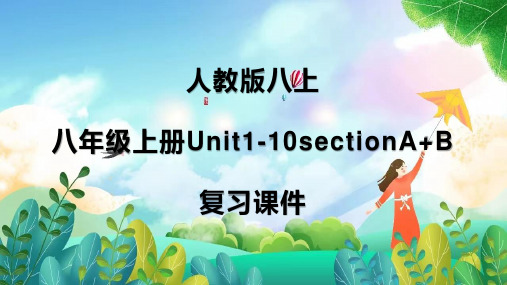
单词复习
famous著名的 well-known著名的 nature自然地 agree同意 normal一般的 unless除非不 certainly无疑的 serve服务 look after 照顾 invitation邀请
again再一次 angry发怒的 understanding善解人意的 careless粗心的 often多久 as far关于,至于 natural自然地 turn down拒绝 reply回复 forward发送
until直到 how often多久 how long 多长时间 how soon多久才... lendar日历 daytime白天 in half分成两半 halfway在中途 else别的,其他的
单词复习
how munch多少钱 how far多远 be good for对....好 be good at擅长...... be bad for 对.......有坏处 be good with 与....相处的好 wrong怎么了? halfway在中途 else别的,其他的
今日复习的重点
本单元的所有单词、短语、语法、长难句、课文
grow成长 meeting遇见 pollute污染 prepare准备 prepare for准备 two两个 twice两次 one一个 once一次 health健康 healthy健康的
单词复习
upset沮丧的 different不同的 unhealthy不健康的 difference差异 foot脚 feet脚步 advice建议,劝告 another其他的 happen发生 expect 期待
单词复习
mistake错误 week一周 a lot of 大量 be good for 对什么好 stress压力 get back返回 careful小心的 careless粗心的 advice建议 solve步骤 during在........期间
(人教版新目标)八年级英语上册全册各单元知识点期末总复习讲解教学课件

3. feel like “感受到;摸起来”,后跟宾语 从句或名词。 I felt like I was a bird. 我感觉我是一只鸟。 It feels like a stone. 它摸起来像一块石头。
eg.something special; somewhere wonderful. 2.不定代词做主语时,谓语动词用第三人称单数。 eg.Is everybody here? 大家都到齐了吗?
1. get to/reach/arrive 都是“到达“的意思。
get to+sp=reach+sp = arrive at+sp(小)=arrive in+sp(大) 若他们后面要加地点副词here, there, home等,则 不需要加介词。
25、up and down上上下下 26、come up出来 27、enjoy oneself=have fun=have a good time
玩的开心
二、重要句子(语法):
1.Where did you go on vacation? 你到哪里去度假了?
I went to New York City. 我去了纽约城。
三、习惯用法、搭配
1. buy sth. for ab./ buy sb. sth. 为某人买某物 2. taste + adj. 尝起来…… 3. nothing to do but do除了……之外无事可干 4. seem + (to be) + adj 看起来 5. arrive in + 大地方 / arrive at + 小地方 到达某地 6. decide to do sth=make a decision决定做某事 7. try doing sth. 尝试做某事
牛津译林版八年级上册8A英语期末复习各单元语法知识点提纲
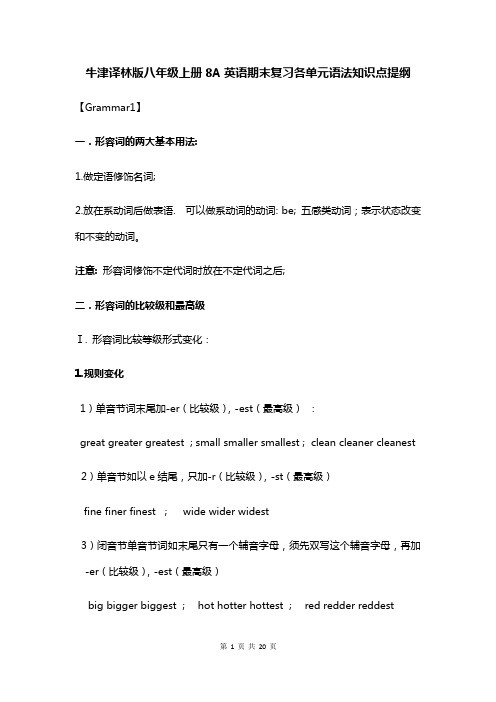
牛津译林版八年级上册8A英语期末复习各单元语法知识点提纲【Grammar1】一.形容词的两大基本用法:1.做定语修饰名词;2.放在系动词后做表语. 可以做系动词的动词: be; 五感类动词;表示状态改变和不变的动词。
注意:形容词修饰不定代词时放在不定代词之后;二.形容词的比较级和最高级Ⅰ. 形容词比较等级形式变化:1.规则变化1)单音节词末尾加-er(比较级),-est(最高级) :great greater greatest ; small smaller smallest ; clean cleaner cleanest 2)单音节如以e结尾,只加-r(比较级),-st(最高级)fine finer finest ; wide wider widest3)闭音节单音节词如末尾只有一个辅音字母,须先双写这个辅音字母,再加-er(比较级),-est(最高级)big bigger biggest ; hot hotter hottest ; red redder reddest4)以辅音字母+y结尾的词,则变y为-i,再加-er和-est。
easy easier easiest ; busy busier busiest5)部分双音节和多音节词在前面加单词more和most。
Careful more careful most carefulDifficult more difficult most difficult2.不规则变化good/well better best bad/ill worse worstmany/much more most little less leastfar farther/further farthest/furthest注:有些形容词一般没有比较等级。
如: right, wrong等。
三. 形容词比较级的用法:表示两者(人或物)的比较。
⒈表达“A大于B”用 A …比较级+than B①. Tom比我胖。
八年级上册英语期末备考知识点

期末备考一、必考语法二、必考短语归类考点一 try的常见短语try (not) to do sth. 尽力(不)做某事;尽量(不)做某事try doing sth. 试着做某事try on 试穿try one’s best to do sth. 尽某人最大努力做某事have/take a try 试一下考点二 help的常见短语help sb. (to) do sth. 帮助某人做某事help sb. with sth. 帮助某人做某事with the help of 在……的帮助下help oneself to 随便吃/喝……考点三“go+动名词”的常见短语go fishing 去钓鱼go skating 去滑冰go climbing 去爬山go swimming 去游泳go skiing 去滑雪go cycling 去骑自行车考点四“动词+up”的常见短语pick up 捡起;拾起look up 查阅;查找wake up 叫醒;醒来get up 起来;起床grow up 长大eat up 吃完give up 放弃put up 搭起;搭建考点五 how构成的特殊疑问短语how many 多少how much 多少;多少钱how often 多久一次how long 多长时间how soon 多久以后how old 多大年龄how tall 多高how big 多大how deep 多深how heavy 多重考点六 look的常见短语look at 看look for 寻找look up 向上看;查阅look after 照顾look through 浏览look around 向四周看look out (for) 小心look down 向下看have/take a look 看一看look forward to 期待look like 看起来像look over 仔细检查look up to 钦佩;仰慕look down on/upon 看不起;藐视考点七 shake的常见短语shake one’s head 摇头shake hands (with sb.) (和某人)握手milk shake 奶昔考点八 turn的常见短语turn on 打开turn off 关闭turn in 上交turn up 开大;调高turn down 开小;调低;拒绝turn into 变成考点九 piece的常见短语a piece of bread 一块面包;一片面包a piece of news 一则新闻a piece of music 一首乐曲a piece of information 一条信息a piece of meat 一块肉;一片肉考点十 prepare的常见短语prepare for 为……做准备prepare to do sth. 准备做某事prepare sth. for sb. 为某人准备某物三、必考句型整理1. I felt like I was a bird. 我感觉自己就像一只鸟。
(必考题)初中英语八年级上册期末知识点总结(答案解析)

一、131.—How often do you play the game Glory of the King (《王者荣耀》), Wang Fei?—_________. I don’t like it at all, and I think doing it is a waste (浪费) of time.A.Twice a week B.Never C.Every day D.Sometimes B解析:B【详解】句意:-王菲,你多久玩一次《王者荣耀》这个游戏?-从不玩,我根本就不喜欢这个游戏,我觉得玩这个游戏是浪费时间。
Twice a week一周两次;Every day每天;Sometimes有时候。
根据答语I don’t like it at all, and I think doing it is a waste (浪费) of time.可知,这里是否定的回答,故选B。
2.You should ______the traffic when you’re driving the car on the roa d.A.look after B.pay attention to C.set up D.take away B解析:B【解析】【详解】句意:当你在路上开车的时候,你应该注意交通。
考查动词短语。
A. look after照顾、照看;B. pay attention to注意;C. set up建立;D. take away带走、拿走。
根据语境“你应该_____交通,当你在路上开车的时候。
”可知此处表达的是“注意”,结合选项可知B选项符合题意,故答案选B。
3.--Wow, you are cool!--Thank you. I_____ wear my school uniform, but my mother washed it yesterday and it is still wet now.A.might B.should C.can D.may B解析:B【详解】句意:-哇!你太酷了。
牛津译林八年级上册英语期末复习重点知识
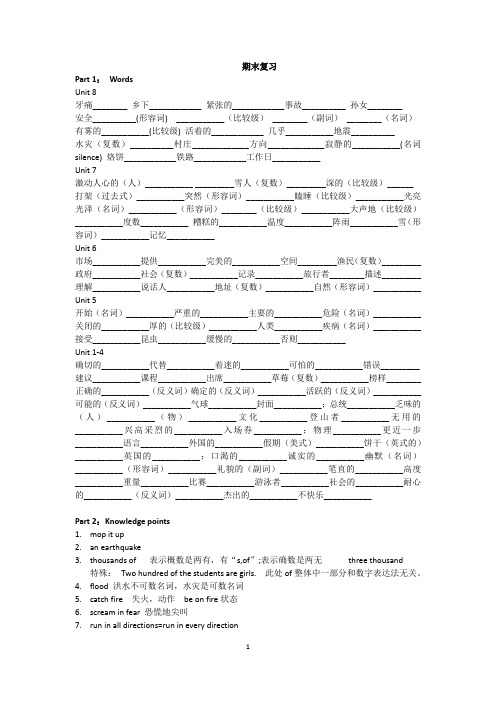
期末复习Part 1:WordsUnit 8牙痛________ 乡下____________ 紧张的____________事故__________ 孙女________安全__________(形容词) ___________(比较级)________(副词)________(名词)有雾的___________(比较级) 活着的____________ 几乎___________地震__________水灾(复数)__________村庄_____________方向_____________寂静的___________(名词silence) 烙饼____________铁路____________工作日___________Unit 7激动人心的(人)___________ _________雪人(复数)_________深的(比较级)______打架(过去式)___________突然(形容词)___________瞌睡(比较级)___________光亮光泽(名词)___________(形容词)________(比较级)___________大声地(比较级)___________度数___________ 糟糕的___________温度___________阵雨___________雪(形容词)___________记忆___________Unit 6市场___________提供___________完美的___________空间_________渔民(复数)_________ 政府___________社会(复数)___________记录___________旅行者________描述_________ 理解___________说话人___________地址(复数)___________自然(形容词)___________ Unit 5开始(名词)___________严重的___________主要的___________危险(名词)___________ 关闭的___________厚的(比较级)___________人类___________疾病(名词)___________ 接受___________昆虫___________缓慢的___________否则___________Unit 1-4确切的___________代替___________着迷的___________可怕的___________错误_________ 建议___________课程___________出席___________草莓(复数)___________榜样________ 正确的___________(反义词)确定的(反义词)___________活跃的(反义词)___________ 可能的(反义词)___________气球___________封面___________;总统___________乏味的(人)___________(物)___________文化___________登山者___________无用的___________兴高采烈的___________入场券___________;物理___________更近一步___________语言___________外国的___________假期(美式)___________饼干(英式的)___________英国的___________;口渴的___________诚实的___________幽默(名词)___________(形容词)___________礼貌的(副词)___________笔直的___________高度___________重量___________比赛___________游泳者___________社会的___________耐心的___________(反义词)___________杰出的___________不快乐___________Part 2:Knowledge points1.mop it up2.an earthquake3.thousands of 表示概数是两有,有“s,of”;表示确数是两无three thousand特殊:Two hundred of the students are girls. 此处of整体中一部分和数字表达法无关。
八年级上册英语期末复习知识点整理

八年级上册英语期末复习知识点整理八年级上册英语期末复习知识点整理马上就要开学咯,你做好复习的准备了吗,本文是店铺为大家整理的八年级上册英语期末知识点资料汇总,希望能给同学们带来帮助!Module 11.study plan学习计划2.a number of +可数名词复数+V(复数):许多、大量the number of+可数名词复数+V(单数):……的数量3.advice不可数名词a piece of advice一条建议give sb. someadvice给某人一些建议advise sb. to dosth.建议某人去做某事4.write it/themdown把它写下来5. what else?还有什么其他的?6. It is adj. forsb. to do sth.7. It is a goodidea to do sth.8.meet sb.接某人9.this term这学期last term上学期next term下学期10. help sb. dosth.help sb. with sth.11.ask for advice征求意见12.basic questions基本问题13.spend… on sth.spend …(in) doingsth.花费时间做某事sth cost sb some moneyIt takes sb. sometime to do sth.pay for14.the meaning of….的意思15.speak to sb.与某人谈话16.take a deepbreath深呼吸17.start aconversation开始一段谈话18.talk about sth.with sb.跟某人谈论某事19.表示建议的句子①What about doing=How about doing…?②Why not do=Why don’t you do..?③Try (not) to do sth.④should do⑤It’s a good idea to do sth.⑥Would you like to do sth.⑦Let sb do sth.⑧Remember to do sth.=Don’t forget to do sth.⑨you’d better do sth.其他知识点:1.give up放弃2. ask sb. to dosth.让某人去做某事3.improve oneself提高某人rmation消息信息,不可数名词5.leave sth.落下什么东西6.as作为7.like 喜欢、像8.at the age of在……岁时9.experience经验(不可数名词)experience经历(可数名词)work工作(不可数名词)著作(可数名词)Job工作(可数名词)10.once/twice/threetimes提到次数的时候,用现在完成时11.finish doingsth.完成做某事12.go off灯熄灭13.so far 迄今为止(现在完成时)14.lose one’sway=lose oneself迷路15.be away from远离16. be sorry to dosth.17.listen to theradio听收音机18.write to sb.写给某人19.would like todo sth.愿意去做某事20. want to dosth.21. adj enough todo sth.22.try one’s bestto do sth.尽某人最大能力去做某事23. everyday (adj.)every day(adv.)24.teacher withglasses戴眼镜的老师Module 2travel around theworld环球旅行invite sb. to dosth.邀请某人去做某事stay with sb.跟某人呆在一起one day总有一天1.put on take off穿上,脱下land in 着陆 take off起飞2. the price of…… ……的价钱3.dream of/aboutsth.梦到某物4. What do youreckon?What do you thinkof…?How do you like…?5.have been to 去了回来了have gone to 去了没回来6.fly to sw.飞到某地because+句子because of +n./名词短语7.western food西方食物8.more than=over 超过9.sell out卖光e true实现Module 31. What are you upto? =what are you doing?你正在做什么? up to忙于做某事2.just now刚刚(一般过去时)the latest news最新消息3. Don’t panic!不要惊慌4.on the news在新闻上5.in space在太空6.on business出差7. show sth. tosb.=show sb. sth.8. borrow sth.from sb.lend sth. to sb.lions of 数以百万计的具体数字+million10.none of+可数名词复数+V单数11.be called…被叫做……12.also用于句中too 用于句末,但有逗号as well用于句末,但没有逗号13.grow up长大14.alone无感情色彩be alonelonely有感情色彩feel lonely15.prefer A to Bprefer doing A todoing Bprefer to do Arather than do B16.so far迄今为止(现在完成时)17.feel like doingsth.喜欢做某事18.as adj.(原级) as 像……一样19.so that如此……以至于20.现在完成时的结构主语+have/has动词的过去分词just/already一般用于肯定句yet一般用于否定句和疑问句① for+一段时间(for five years)② since+一个时间点(since 8 o’clock yesterday)③ since+具体的年份(since 1990)④ since+一段时间+ago(since five years ago)当有一段时间存在时,终止性动词必须变成延续性动词① die → be dead② begin/start → be on③ buy → have④ borrow → keep⑤ come/go → beModule 41.how long多久2.get on well withsb.与某人相处融洽3. learn a foreignlanguage4. the Hope School5.Project Hope希望工程6.poor children贫困儿童7.in fact事实上8.tell me more说的更多点9.how long用for+一段时间/since+时间点回答how often用频度副词来回答how soon用in+一段时间提问(一般是一般将来时)how far多远,提问路程多远10.take part 参加11.aneight-year-old boy12.drop out ofschool辍学13.on the farm在农场上14.be ill生病15.have to do sth.不得不去做某事16.get aneducation得到教育17.with the help of在……的帮助下18.people in Chinaand abroad国内外的人们19.because of由于luck (n.)→lucky (adj.)→luckily (adv.)care (n.)→careful(adj.) →carefully (adv.)20.反意疑问句:前肯后否、前否后肯反意疑问句必须换成主语的代词谓语动词在时态和人称上要保持一致表示否定意义的词:never/hardly/few/little/nothing/seldom/no① there be→be there?② You’d better→hadn’t you?③ Let’s→shall we?④ Let us→will you?⑤ 祈使句→will you?⑥ 一般现在时→do/does 主语?⑦ 现在进行时→am/is/are 主语?⑧ 一般过去时→did 主语?⑨ 过去进行时→was/were 主语?⑩ 现在完成时→have/has 主语?⑾情态动词→情态动词主语?若句子里含有否定的意义,那么yes翻译成“不”,no翻译成“是”Module 51.反意疑问句的相关知识P1722.Who is it by?由……作曲3.be sure of/aboutsth.对某事有把握、确信4.be sure to dosth.确信去做某事5.hear of sth.听说6.the capital of……的首都7.what’s yourfavourite…你最喜欢的……是什么?8.a fan of……的粉丝9.give us a break休息一会10.I don’t believeit!我不相信它!11.not only..butalso..不但……而且……(就近原则)12.describe Chinato the rest of the world把中国介绍给世界的其他部分13.bring westernand Chinese music together把中西方音乐结合14.in additionto=besides除了Module 61. How is it going?过的怎么样?2. send sb. sth.=send sth. to sb.3. go on继续4. by the river在河边5. be late晚的、迟的6. in a tree人在树上on a tree 水果在树上on the grass在草地上7. smile at sb.朝某人微笑8. fall behind落后fall down=go down摔落9. every/each(每个)+V单数10. tired累的(人)tiring累的(物、事)11. have nothing to do无事可做12. what for=why13. think of认为think about考虑14. take sth. out of 拿出take away拿走带走take off飞机起飞、脱衣服15. get up起床16. on one’s way to …在某人去……的.路上17. 表示过去进行时的短语:At that time/atthat moment/at this time yesterday/at…o’clock yesterday/from…to…last night 主语+was/were+doing过去某个时刻正在做某事Module 71. smell/look/taste/feel/sound+adj.2. What’s the matter with you?What’s wrong withyou?3. be afraid+句子be afraid to dosth.害怕做某事be afraid of doingsth.4. try to do sth.try one’s best todo sth.尽某人最大能力去做某事5. What is she like?(性格、内在特征)What does she looklike?(外貌)6. introduce A to B把A介绍给Bintroduce oneself自我介绍7. hear from=get a letter from=receive aletter from收到某人来信8. thanks for sth.9. can’t wait to do sth.等不及去做某事10. when 引导的时间状语从句:主将从现11. wear glasses戴眼镜12. arrive at+小地点 arrivein +大地点reach sw.get to sw.13. sound like听起来像14. as well也15. the captain of……的队长16. be proud of…因……而骄傲17. work hard努力工作18. get/be angry with sb.be angry at/aboutsth.19. bad marks坏分数20. at first首先21. a bit=kind of稍微、有点儿Module 81. show sb. sth.=show sth. to sb.2. the map of………的地图3. over there在那儿4. do some shopping=go shopping5. 表示静止的方位:on the right/leftin the middle ofon the corner ofbetween…and…opposite…next toin front ofbehind表示动态的方位:go along=go down=walk along=walkdowngo acrossgo straight aheadturn left/rightinto…6. 表示问路的话Where is the …?How can I get tothe…?Which is the wayto the…?Can you tell methe way to the…?7. welcome to…8. a clear day晴朗的一天9. get off下车αget on上车Module 91. danger(n.) in danger处于危险中dangerous(adj.)αsafe2. beexcited to do sth.兴奋去做某事3. makesb. do sth.make sb. adj.make sb. n.4. haveno place to live in没有地方可住5. takeaway带走6. inpeace和平的7. onearth究竟8. lookfor寻找(过程)find找到(结果)find out查清(通过研究找出结果)9. besurprised to do sth.惊奇的去做某事10. look after=take care of11. there be sb./sth. doing sth.某地有sb./sth.正在做某事12. live on 以……为生13. less and less越来越少more and more越来越多14. make a plan定一个计划15. adj. enough to do sth.足够……去做某事16. go back=return返回17. the symbol of……的象征18.such as没有逗号,后面一般加n.或者短语for example一般有逗号,后面一般加句子Module 101. How is it?事情进展的怎么样?2. places of interest名胜be/becomeinterested in sth./doing sth.interested形容人interesting形容物或者事3. offer to do sth.主动提出去做某事4. agree to do sth.同意去做某事agree with sb.同意某人agree on sth.同意某事5. almost几乎hardly几乎不(表示否定)6. though/although虽然but但是(不可以同时出现)7. have a good time=enjoy oneself8. take place=happen发生9. be famous for因……而著名be famous as作为……而著名10. the story of……的故事11. the centre of……的中心12. be born in sw./on+日子13. one of 最高级+可数名词复数+V单数14. fall in love with sb.爱上某人15. be full of=be filled with16. fill A with B把B装到A里17. find it adj. to do sth.18.plan/decide/hope/want/agree/offer/try/want/wish/begin/need/ forget/learn/+ to do sth.help/make sb. dosth.be glad to do sth.give sb. sth.=givesth. to sb.(bring/lend/hand/send/show/leave/teach)buy sb. sth.=buysth. for sb.(cook/read)Module 111. it is adj. to do sth.it is n. to do sth.it takes sb. some time to do sth.动词不定式做主语的时候,谓语动词用单数To see is not to believe.2. it is possible(impossible) to do sth.it is possible that…主语+will probably/possibly+ Veg:It will probably/possibly be sunnytomorrow.3. so… that 如此……以至于4. depend on 依赖、依靠5. 雨雪的大用heavy风的大用strong6. be + adj.adj. +n.V. +adv.7. spring,summer,autumn(fall),winter8. 不客气的几种说法:You are welcome.That’s all right.=That’s ok.With pleasure.My pleasure.It’s a pleasure.9. be pleasant to do sth.很高兴去做某事10. take photos of sth.11. bring sb. around sw.take sb. around sw.带某人到处参观12. the best place to do sth.去做某事的最好地方the best time to do sth.去做某事的最好时间13. It is a good idea/way to do sth.14. What’s the weather like?=How is the weather?What will the weather be like?=How will the weather be?15. at the moment=now16. be off to sw.动身去某地17. you’d better do sth.你最好做某事18. 不定代词(something/anything/nothing/ somebody/adybody/nobody)+adj.to do sth.19. joke with sb.跟某人开玩笑joke about sth.就某事而开玩笑tell jokes讲笑话20. between…and…在……和……之间21. from…to…从……到……22. You must be joking!Sounds great!听起来不错Come on 赶快23. too much+不可数名词太多……much too+adj.太……24. 季节/年份/月份/前+in日期前+on25. in the end可单独使用at the end of在……的最后26. n. adj.sun sunnycloud cloudyrain rainywind windysnow snowystorm stormyshower showery27. the temperature will be…the temperature of Dalian is…Module 121. stop to do sth.停下来去做某事stop doing sht. 停下来正在做的事情2. hang on 等等/别挂断3. immediately=atonce=right now4. accept 接受receive收到5. in red paper6. use both hands7. cut one’s hair8. you can’t beser ious!9. just wait andsee.10. both两者都+V复either两者中的任何一个+V单neither两者都不+V单11. make noise12. enjoy one’sstay13. not…but…不是……而是……14. be differentfrom15. the same as与……相同16. hear sb. doingsth.听到某人正在做某事hear sb. do sth. 听到某人做某事的全过程17. on time按时18. catch a cold感冒catch a bus赶公共汽车catch up withsb./sth.追赶某人/某物19. let sb. dosth.让某人做某事20. stay out呆在外面21. can提问:肯定:can否定:can’tmay提问:肯定:can否定:mustn’t/can’t/sorrymust提问:肯定:must否定:needn’t22. 物主代词后+名词a +可数名词单数介词和动词后+doing情态动词的题一般根据翻译来做有not sure一般用may/might交通规则一般用mustn’t23. There isnothing in the room, but(除了)a bed.We won’t have themeeting this afternoon but(而是) tomorrow afternoon.24. milk coffeetea water juice 都是不可数名次25. a few+可数名词复数:许多……a little +不可数名词:许多……few+可数名词复数:几乎没有……(表示否定)little+不可数名词:几乎没有……(表示否定)下载全文。
八年级上册英语总复习(知识点汇总)

八年级上册英语总复习(知识点汇总)
一、基本语法知识点
- 词汇:掌握八年级上册涉及的词汇,如名词、动词、形容词、副词等。
- 时态:熟悉一般现在时、一般过去时和一般将来时的构成和
用法。
- 句子结构:了解简单句、并列句和复合句的组成和使用方法。
- 语态:理解被动语态的构成和用法。
二、听力技巧
- 注意听力材料中的关键词,并对比选项进行判断。
- 注意听力材料中的语音语调,辨别重要信息。
- 注意时间、地点和人物等信息的提取。
三、阅读技巧
- 预览文章段落,了解大意及文章结构。
- 注意文章中的关键词,理解整个文章的主旨。
- 根据文章内容填写相关信息、选择正确答案或完成文章概述。
四、写作技巧
- 了解不同类型的写作任务,如叙述、说明、议论等。
- 练使用适当的词汇和句型表达自己的观点和想法。
- 注意书写格式、语法和拼写,提高写作质量。
五、语言知识
- 重点掌握八年级上册课本中的课文及相关练的语法、词汇和
常用句型。
- 针对容易出错的语言知识进行专项练,加深理解和记忆。
六、口语练
- 进行口语练,提高口语表达能力。
- 多参与英语口语交流,积累口语表达经验。
七、其他技巧
- 多听英语广播、看英文电影或电视剧,提高英语听力水平。
- 多做英语练题,培养解题技巧和思维能力。
以上为八年级上册英语总复习的知识点汇总,希望对你的学习有所帮助!。
人教版八年级英语上册期末复习课件

2.当然;自然 . of course .
3.给……的感觉;感受到 . feel like .
4.因为 . because of .
5.几乎从不 __h_a_r_d_l_y_e_v_e_r__
6.至少;不少于;起码 at least .
15. 玩得开心 have a good time
16. 在过去 in the past
.
17.四处走动;绕……走 walk around… .
18.帮助做家务 help with housework .
19.多久一次 how often .
20.有空 be free .
21.每周一次 once a week .
3. result
(n.)A. 结果;后果
B. 成绩;得分;成果
(v.)C. 导致;终结
(1)The waste of water resulted in the pollution of this river.
_____C___
(2)They want to get good results so that they can go further for
.
四、重点句型
1.我真的没有看到我喜欢的东西。 I really didn't see __a_n_y_t_h_in_g____ ___I__ __li_k_e_d____.
2.多么不同的一天啊! What a __d__if_fe_r_e_n_t____ day!
3.我想知道过去这儿的生活是什么样子。 I ___w_o_n_d_e_r__ what life was like here __in____ ___th_e___ __p_a_s_t___.
人教版英语八年级上册期末复习必考知识点复习课件

8. He thinks the first step is to find someone you trust to talk to. 他认为,第一步是要找到一个你信任的人谈一 谈。-----to do在此句子中做表语。
invite sb to do sth. 邀请某人做某事 invite sb to s.p邀请某人去某地 prepare for 为……做准备 prepare to do sth. 准备做某事 prepare sth. for sb. 为某人准备某物
be full of=be filled with充满.... be covered with被...所覆盖 make mistakes犯错误 share...with与...分享 be angry with sb对某人生气
13. I’m shy so it’s not easy for me to make friends. ---it做形式主语,真正的主语是后面的to make friends.
重点语法知识点
1. 不定代词的用法 不定代词是指代替或修饰不特指的人或事物的词。 (1)some和any既可修饰复数可数名词,也可修饰不可数名词。 some多用 于肯定句, any则多用于否定句、疑问句和条件状语从句。 (2)some用于疑问句时,表示建议、请求或希望得到对方肯定的答复。
9. When we make resolutions at the beginning of the year, we hope that we are going to improve our lives. 当我们在 年初下决心的时候,我们希望改善我们的生活。----hope后面跟上了一个宾语从句,that可省略。
人教版初中英语八年级上册英语知识点归纳总结复习(单词、短语、句子、语法、练习)
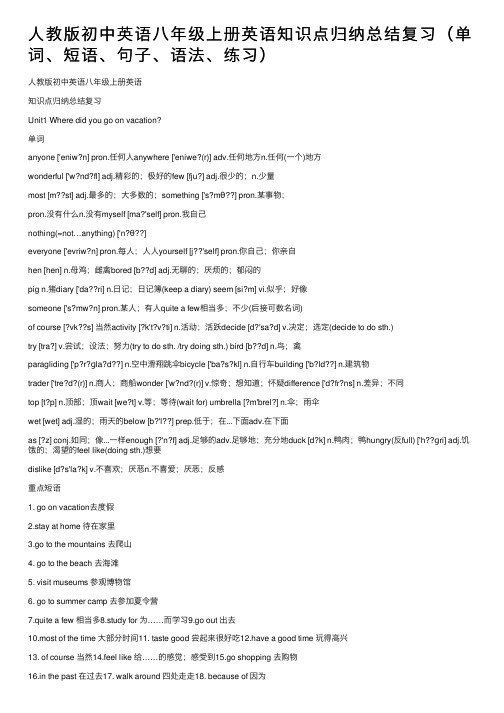
⼈教版初中英语⼋年级上册英语知识点归纳总结复习(单词、短语、句⼦、语法、练习)⼈教版初中英语⼋年级上册英语知识点归纳总结复习Unit1 Where did you go on vacation?单词anyone ['eniw?n] pron.任何⼈anywhere ['eniwe?(r)] adv.任何地⽅n.任何(⼀个)地⽅wonderful ['w?nd?fl] adj.精彩的;极好的few [fju?] adj.很少的;n.少量most [m??st] adj.最多的;⼤多数的;something ['s?mθ??] pron.某事物;pron.没有什么n.没有myself [ma?'self] pron.我⾃⼰nothing(=not…anything) ['n?θ??]everyone ['evriw?n] pron.每⼈;⼈⼈yourself [j??'self] pron.你⾃⼰;你亲⾃hen [hen] n.母鸡;雌禽bored [b??d] adj.⽆聊的;厌烦的;郁闷的pig n.猪diary ['da??ri] n.⽇记;⽇记簿(keep a diary) seem [si?m] vi.似乎;好像someone ['s?mw?n] pron.某⼈;有⼈quite a few相当多;不少(后接可数名词)of course [?vk??s] 当然activity [?k't?v?ti] n.活动;活跃decide [d?'sa?d] v.决定;选定(decide to do sth.)try [tra?] v.尝试;设法;努⼒(try to do sth. /try doing sth.) bird [b??d] n.鸟;禽paragliding ['p?r?ɡla?d??] n.空中滑翔跳伞bicycle ['ba?s?kl] n.⾃⾏车building ['b?ld??] n.建筑物trader ['tre?d?(r)] n.商⼈;商船wonder ['w?nd?(r)] v.惊奇;想知道;怀疑difference ['d?fr?ns] n.差异;不同top [t?p] n.顶部;顶wait [we?t] v.等;等待(wait for) umbrella [?m'brel?] n.伞;⾬伞wet [wet] adj.湿的;⾬天的below [b?'l??] prep.低于;在...下⾯adv.在下⾯as [?z] conj.如同;像...⼀样enough [?'n?f] adj.⾜够的adv.⾜够地;充分地duck [d?k] n.鸭⾁;鸭hungry(反full) ['h??ɡri] adj.饥饿的;渴望的feel like(doing sth.)想要dislike [d?s'la?k] v.不喜欢;厌恶n.不喜爱;厌恶;反感重点短语1. go on vacation去度假2.stay at home 待在家⾥3.go to the mountains 去爬⼭4. go to the beach 去海滩5. visit museums 参观博物馆6. go to summer camp 去参加夏令营7.quite a few 相当多8.study for 为……⽽学习9.go out 出去10.most of the time ⼤部分时间11. taste good 尝起来很好吃12.have a good time 玩得⾼兴13. of course 当然14.feel like 给……的感觉;感受到15.go shopping 去购物16.in the past 在过去17. walk around 四处⾛⾛18. because of 因为⼀碗…… 20. the next day 第⼆天21. drink tea 喝茶19. one bowl of… 22. find out 找出;查明23. go on 继续24.take photos 照相25. something important 重要的事26. up and down 上上下下27. come up 出来28. buy sth. for sb. / buy sb. sth. 为某⼈买某物29. taste + adj. 尝起来…… 动词原形除了……之外什么都没有30. look+adj. 看起来…… 31.nothing…but+32.seem+(to be)+ adj. 看起来…… 33. arrive in+⼤地点/ arrive at+⼩地点到达某地34.decide to do sth. 决定去做某事35. try doing sth. 尝试做某事/ 36. try to do sth. 尽⼒去做某事37. forget doing sth. 忘记做过某事/ 38. forget to do sth. 忘记做某事39. enjoy doing sth. 喜欢做某事40. want to do sth. 想去做某事41. start doing sth. 开始做某事42. stop doing sth. 停⽌做某事43. dislike doing sth.不喜欢做某事44. keep doing sth. 继续做某事45. Why not do. sth.? 为什么不做……呢?46. so+adj.+that+从句如此……以⾄于…… 47. tell sb. (not) to do sth. 告诉某⼈(不要)做某事48 .have a good time=enjoy oneself=have fun(doing sth.)玩得痛快三、重点句⼦:1. Where did you go on vacation? 你去哪⼉度假的?2. Long time no see. 好久不见。
- 1、下载文档前请自行甄别文档内容的完整性,平台不提供额外的编辑、内容补充、找答案等附加服务。
- 2、"仅部分预览"的文档,不可在线预览部分如存在完整性等问题,可反馈申请退款(可完整预览的文档不适用该条件!)。
- 3、如文档侵犯您的权益,请联系客服反馈,我们会尽快为您处理(人工客服工作时间:9:00-18:30)。
新目标英语八年级(上)期末复习一、非谓语动词1、动词 +不定式1) want\would like\ask\tell\forbid (sb.) to do sth. (注:ask\tell sb.not to do sth.叫某人不干某事 )2) plan\hope\decide to do sth.计划、希望、决定去干某事2、动词 +v-ing1)enjoy\finish\practise doing sth.喜欢、完成、练习干某事2) spend +时间、金钱(in) doing sth.花费时间、金钱干某事3) have fun doing sth.干某事很愉快have problems doing sth.干某事有困难3、动词 +不定式或v-ing1) stop to do sth.停下来,要去干某事stop doing sth. 停止正在干的事2) forget\remember to do sth.忘记、记住要去干某事Forget\remember doing sth.忘记、记得已干的事3) like\love\hate to do sth. 喜欢、讨厌去干某事like\love\hate to doing sth 喜欢、讨厌干某事 ( 习惯性的 )4)start\begin to do或 doing sth.开始干某事(两种表达意义区别不大)4、 make\let\help sb.do sth.使、让、帮助某人干某事5、 see\watch \ hear sb.do sth. 看见、听见某人干某事(一般包含某事全过程)See\ watch \hear sb.doing sth. 看见、听见某人正在干某事6、 It takes\took sb.+时间、金钱to do sth. 某人花费时间、金钱去干某事=sb. spend时间、金钱(in) doing on sth.二、形容词与副词1、形容词 +ly ---副词如: quick----quickly heavy----heavily1)形容词修饰名词、代词等,修饰不定代词时,放在不定代词之后。
如:Something different不同的东西 somewhere quiet and beautiful安静又美丽的地方2)副词修饰动词、形容词、副词等,修饰动词时,一般放在动词或动词短语之后。
如:rain heavily雨下得大3) look 看起来sound 听起来 smell闻起来 taste 尝起来等系动词之后常用形容词如: You don ’ t look well today. 你今天看起来脸色不好。
That sounds interesting. 听起来很有趣。
(注意: look\sound like +名词如: That sounds like a good idea . )2、形容词与副词的比较级 :1)两者间的比较,表示比、更、较。
a. It ’ s easier to say than to do .说比做容易。
b. Which is bigger,the sun or moon?太阳和月亮,哪个更大?c. Lucy is taller of the two . 露西是两者中较高的。
2)比较级前常见的修饰词:much\even\any\far\a little\a bit\a lot等表示程度的副词。
如: It ’s a little colder than yesterday. 今天比昨天冷一点。
形容词比较级前可以加表示数量的词。
如 :My brother is five years older than me. 我哥哥比我大五岁。
3)比较级的特殊用法:a.越来越⋯⋯:① 单音节Our country is becoming er+and+ 单音节 erstronger and stronger(即比较级 +and+比较级)如:. 我们的国家越来越强大。
② more and more+多音节形容词、副词如:English is becoming more and more popular. 英语越来越普遍了。
b.越⋯,就越⋯the+ 比较级 , ,the+ 比较级,如:The more carefulyou are,the fewer mistakes you will make.你越仔细,你犯的错误就越少注意:比较的对象要一致如: Your bag is heavier than Lily.(× ) Your bag is heavier thanLily’ s.(√ )3、形容词、副词最高级: 1) 三者或三者以上的比较,表示“ 最”,句中常有表示范围的介词短语 of the three\us或in our class\family等。
注意,形容词最高级前要加the .2) 最高级特殊用法①序数词后 +最高级,表示“ 第几 , (长、大、远)”The Yellow River is the second longest river in China.黄河是中国第二长河。
② one of+ 形容词最高级 +可数名词复数。
“最, 的, 之一”Chongqing is one of the biggest cit ies in China.重庆是中国最大的城市之一。
③某人的 +形容词最高级,表示“ 某人的最,”如: Linda is my sister ’ s best friend. 琳达是我妹妹最好的朋友。
3)特殊句型:最好干某事:① It’ s best to do sth.②You’ d better do sth.如: It ’ s best to go home now. 现在最好回家。
You’ d better do your homework first.你最好先做作业。
三、宾语从句宾语从句在复合句中做主句的宾语,常放在 know/say/think/ask等之后,通常由下面一些词引导。
1)由 that引导,that通常省略.如:I don ’ t think (that) differences are important in a friendsh.Some reader said (that) they are going to eat more vevetables.2)由连接代词或副词( what/when/where/who 等)引导。
(从句部分要用陈述语序)如:Thomas wants to know where Nina lives.It is interesting to hear what the class think about action movies.3)由连词if/whether引导,意为“是否”.She ask me if she could borrow these books.她问我能是否能借这些书。
宾语从句的事态一般与主句一致,但若从句讲的是客观事实,则保持用一般现在时。
如:The teacher told us that the moon goes around the earth.老师告诉我们月亮绕着地球转。
(虽然主句用的是一般过去时,但“月亮绕着地球转”是客观事实,所以用goes, 一般现在时)四、状语从句1) when 引导的时间状语从句,表示“当, 时”Mozart started to write music when he was four yeas old.(主句用一般过去时,从句用一般过去时。
)2) if引导的条件状语从句,表示“如果, ”If it rains tomorrow,we won’ t go hiking.(主句用一般将来时,从句用一般现在时。
won’ t = will not)3)until引导的时间状语从句,主句一般用否定。
( not ①事until②事直到②事才①事)如:I didn’ t go to bed until mother came back.我直到妈妈回来才睡觉。
八年级英语上册期末复习资料一、易混词组健康地(副)1. health 健康(名) , healthy 健康的(形) ,healthilyDrinking milk is good for our health.A healthy lifestyle can help us keep healthy.I am going to eat healthily this year.2. may,(情动)maybe(副) ,may be(谓动)可能He may know the answer. = Maybe he knows the answer.He may be at home. = Maybe he is at home.3. be good for对,有利,be good at擅长于,be good with与某人相处好,be good to对某人友好4. think( 认为 ) /hear (听说 ) /because(因为 )+从句think of /hear of / because of+ 名词5. forget/remember to do sth忘记 /记着去做某事forget/remember doing sth忘记 /记着做了某事6. stop to do sth 停下来去做某事stop doing sth 停止做某事7. take, spend, pay, cost花费例: 我买这件外套花了100 元钱 .It took me 100 yuan to buy this coat.(it作主语)I spent 100 yuan on this coat/(in)buying this coat.( 人作主语 )I paid 100 yuan for this coat.( 人作主语This coat cost me 100 yuan.( 物体作主语 )8. Sometime(将来的)某时 , some time 一段时间 ,sometimes 有时 ,some times 几次9.few (几乎没有) , a few(一些) +复数名词little (几乎没有) , a little (一点儿) +不可数名词10.a (large) number of (许多) a small number of (少量的) , the number of ⋯的数量The number of the students in the classroom is 30.教室里学生的数量是 30.11.both(⋯ and)(两者 )都all ( 多者 )都the other( 两者中的 ),另一个 another(多者中的 )另一个between(⋯ and) (两者 ) 之间 among (多者 )之间neither(两者 )都不none(多者 )都不12.赢: win+ 比赛 /奖 beat+某人 /某团体13.参加 :join+ 某人 /组织take part in+ 活动14.in the south of, to the south of, on the south of 在 , 的南方Hainan is in the south of China.( 海南在中国范围之内)Hainan is to the south on Hubei.( 海南在湖北范围之外,且不接壤 )Hunan is on the south of Hebei.( 湖南在湖北范围之外 ,但接壤 )15.太多 : too much+ 不可数名词 , too many+ 复数名词 ;太 : much too+ 形容词或副词16.too, also, either, so 也I like English, too. =I also like English.I don't like English, either.You like English, so do I.( 你喜欢英语 ,我也喜欢 .)17. so, such如此She is so clever that everyone likes her. = She is such a clever girl that everyone likes her. 她如此聪明 ,每个人都喜欢她 .二、重点词组句型1.better and better 越来越好 ,more and more beautiful 越来越美丽2. 10 minutes ' walk= ten -minute walk=10 minutes on foot 十分钟步行的路程 (表示路程,用来回答how far )3.ss +原级 as 像⋯一样 ,not as/so +原级 as 不如He is as tall as you.He is not as/so tall as you.= He is shorter than you.=You are taller than him.4.somewhere interesting 有趣的地方something important重要的事情somebody else别的人5. enough food 足够的食物 (enough+名词 ),big enough 足够大 (形/副+enough)6.one of the most useful animals最有用的动物之一 (one of+最高级+复数 )7. I didn't go to bed until my father came back last night.昨晚直到我爸回来我才去睡觉.8.I'm sorry to hear that. 听到这我很难过 .9.too+ 形 /副原级 to do 太⋯而不能 ,so+形 /副原级 +that+从句如此⋯ 以致不能not+形 /副原级 enough to do 不足够⋯去做My daughter is too young to go to school. = My daughter is so young that she can't go to school.= My daughter is not old enough to go to school.10. I was the first (student) to get to school yesterday.我昨天是第一个到校的(学生 ).11. It's easy to have a healthy lifestyle.= To have a healthy lifestyle is easy. = Having a healthy lifestyle is easy. 拥有健康的生活方式很容易. (动词作主语的三种表达方式)I found it easy to have a healthy lifestyle.我发现拥有健康的生活方式很容易.(动词作宾语 ,需要it作形式宾语 )12. Yellow River is the second longest river in China.黄河是中国的第二长河.(序数词+最高级+名词 )13. finish doing做完某事enjoy doing喜欢做某事practice doing 练习做某事keep doing 一直做某事14. make sb do sth 使某人做某事let sb do sth 让某人做某事15.My sister is the funniest person I know.我姐姐是我认识的人中最风趣的人.(I know为定语从名修饰 person)16.I'm going to do what I want to do.我将做我想做的事 .(what I want to do 为宾语从句 ,用陈述句语序 )17.This is what we learned. 这就是我们所得知的.(what we learned 为名词性从句 ,用陈述句语序)18.I'm going to stay at home if it's rainy tomorrow. 如果明天下雨 ,我就呆在家里 .(if 表示如果 ;主句用将来时 , if 从句只用一般现在时 )19.The more friends I have, the happier I will be. 我的朋友越多 ,我就越快乐 .。
